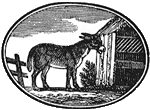
 |
ORGANIC |

The word "organic" is used in all sorts of contexts, often in a highly metaphorical manner; but the subject here is its use in the phrase "organic foods" in claims to superior healthfulness. There is no legally-agreed-upon standard for "organic" food; but generally the label is applied to foods which have been grown without artificial chemicals or pesticides. Literally, of course, the term is a redundancy: all food is composed of organic chemicals (complex chemicals containing carbon). There is no such thing as an inorganic food (unless you count water as a food). Natural fertilizers and pesticides may or may not be superior to artificial ones, but the proper distinction is not between organic and inorganic. Many nitrogen-fixing plants like peas do a great job of fertilizing the soil with plain old inorganic atmospheric nitrogen.
When it comes to nutrition, people are quick to generalize rashly from a narrow scientific basis. After a few preservatives were revealed to have harmful effects in some consumers, many products were proudly labelled "No Preservatives!" I don't want harmful preservatives in my food, but that label suggests to me a warning: "Deteriorates quickly! May contain molds, fungus, and other kinds of rot!" Salt is a preservative.